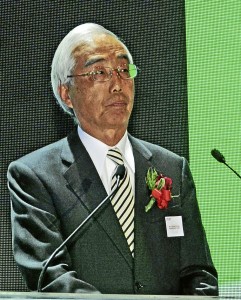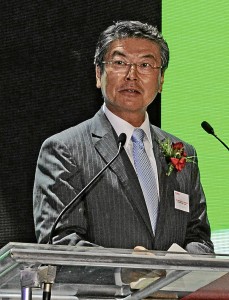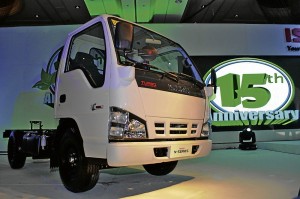Isuzu Philippines: Looking back to 15 years of successful brand building
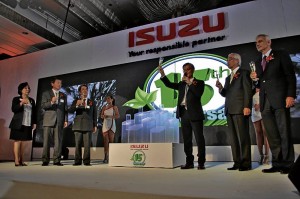
YAMAZAKI (third from right) leads the ceremonial toast to celebrate IPC’s 15th anniversary. Joining him are (from left) Helen Dee, chairperson of Yuchengco Group of Companies; Morikazu Chokki of Mitsubishi Corp.; Takashi Tomita, executive vice president of IPC; Yoshinori Ida of Isuzu; and Fernando Zobel de Ayala, president and COO of Ayala Corp.
It was in July 31, 1997, when then President Fidel Ramos formally inaugurated Isuzu Philippines Corp.’s (IPC) manufacturing plant in Biñan, Laguna.
However, the Japanese brand, known for its durable and dependable diesel-powered vehicles, has been present in the Philippines since the 1950s.
“One could say that Isuzu has been part of every Filipino’s lives. From trucks that continually deliver goods around the country to public and private transports that enable Filipinos to move around more efficiently, the brand has been synonymous with quality, reliability and value-for-money for over 15 years,” said IPC president Ryoji Yamazaki as he welcomed partners and guests at the Rizal Ballroom of the Makati Shangri-La Hotel on Monday.
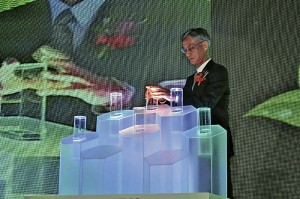
ISUZU Philippines Corp. president Ryoji Yamazaki completing the symbolic crystal that marks IPC’s 15th year in the Philippines
To mark the anniversary, IPC looked back to its history, particularly the various models it produced. “As we celebrate our 15th year milestone, Isuzu will continue to deliver products with the same high quality,” Yamazaki said.
Model evolution
In 1997, IPC started with light commercial vehicles, namely, the Isuzu Trooper SUV, Isuzu TF Series Fuego pickup and the best-selling Isuzu Hi-Lander Asian utility vehicle.
“While the Trooper secured the Isuzu brand’s prestigious image, it was the Fuego that cemented IPC’s reputation for producing workhorse vehicles. The Hi-Lander, on the other hand, enabled us to consistently top Asian utility market,” IPC senior vice president Art Balmadrid said.
In 2001, the Hi-Lander gave way to the Crosswind, which features a more modern body design, improved mechanical parts and more updated features. This model soon spawned several variants that vary in trim level, with some gaining many class-leading features while retaining the vehicle’s functionality.
The TF Series Fuego evolved into the D-Max in 2003. Sporting a larger and more modern body, the D-Max is fitted with a more powerful and more efficient diesel engine. Like the Crosswind, the D-Max was offered in several trims to suit business or personal preferences.
One of the best-sellers
“Almost a decade since its introduction, the D-Max remains as one of the best-selling pickups in the country,” Balmadrid said.
“We should also recognize the evolution of our SUV—from the Trooper to the Alterra, which debuted in 2006. Like the Trooper, the Alterra served as Isuzu’s flagship model, and is equipped with numerous premium features that best its competitors as well as some models that belong to a higher segment. We promise that in the 2013 version, the Alterra’s new offerings will boost IPC’s position in the country’s competitive SUV segment,” Yamazaki said.
Balmadrid said that IPC is also known for its other business-oriented products, namely, the passenger van, N-Series light-duty trucks, F-Series, C-Series and E-Series mid- to heavy-duty trucks, as well as various bus models, that have been posting solid sales performances in their respective segments.
The NHR belongs to the brand’s N-Series models, which have set a record in the Philippines by topping the light-duty truck category for 13 consecutive years, starting in 1999.
“This only proves that the NHR is a truck that Filipino businesses can depend on, highly capable of serving the transport requirements of various industries. Moreover, this testifies to the market’s discernment that brand-new Isuzu trucks and buses offer tremendous advantages over second-hand units,” Balmadrid said.
Friendly relations

SHOWING full support are Campi president lawyer Rommel Gutierrez (left) and Board of Investments Director Rudy Cana
“Production and sales of Isuzu vehicles in the Philippines have expanded and continued over the years owing to the friendly relations between Japan and the Philippines and to all the people present in this gathering. To the customers, for your patronage of Isuzu vehicles, and to all production and sales partners for your usual support, on behalf of Isuzu, I should like to express my heartfelt gratitude,” said Yoshinori Ida, senior counselor and former chair of Isuzu Motors Ltd.
Ida said that looking back to the last 15 years, the Philippines, twice hit by economic crises such as the Asian financial crisis and the collapse of Lehman brothers, has managed to withstand both adverse situations and seems to have stabilized its economy.
He noted that the Philippines automotive industry is yet to enjoy the benefit of the Asean Free Trade Area Agreement (which eliminates tariffs) as what its neighbors have been enjoying for years.
Continue expansion
“However, we wish to assure the Philippine markets as well as our business partners here that Isuzu Motors Ltd. will continue its expansion here. The Philippine government is aware of the situation of the automotive industry and I believe that IPC, together with the other local assemblers, are working closely with the government in coming up with a more favorable program as special consideration to maintain global competitiveness,” Ida said.
Yamazaki added that for the past 15 years, IPC has been one of the proud contributors to the Philippine economy, ensuring that 90 percent of its products are locally assembled.
“We are creating more jobs and continuously supporting our local parts manufacturers. For Isuzu, the Philippines is not just another selling opportunity, but rather a growing economy that we would like to be a part of. Together with the Filipinos, we would like to grow not only for the next 15 years but for the many more years to come,” he said.
Yamazaki also said that IPC will continue to help the country through its various corporate social responsibility (CSR) projects that include the Isuzu-Technical Education and Skills Development Authority (Tesda) Auto Mechanic Training Center in Tacloban, Leyte (this program gives a two-year technical course to underprivileged but deserving youths, a part of Isuzu Motors Ltd. Heart and Smile CSR project that Ida also heads).
“We are still confident that with the support of the government, close cooperation with the automotive manufacturing organization and strong relationship with our local suppliers, we can build a competent environment that is sustainable and can keep up with other Asean countries,” Yamazaki said.

